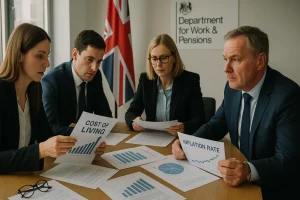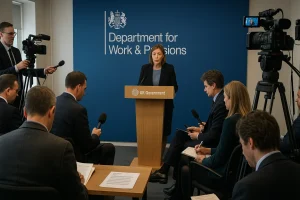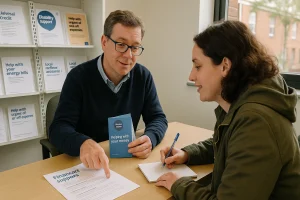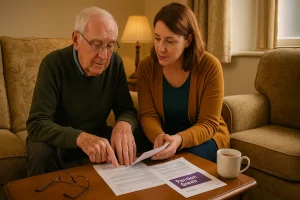Millions of households across the UK continue to face financial difficulties as the cost of living remains elevated in 2025.
From inflated grocery prices to persistent increases in energy bills, families and individuals alike are seeking assistance to bridge the gap between income and expenses.
Among the discussions dominating community forums and social media is a recurring rumour: the Department for Work and Pensions (DWP) is set to issue a £225 Cost of Living Payment.
This blog aims to clarify the misinformation, outline the reality of government support, and guide readers to legitimate resources in 2025.
Why Did the DWP Introduce Cost of Living Payments Between 2022 and 2024?

The reason behind these temporary payments was rooted in crisis response. In 2022, the UK faced an inflation rate peaking at 11.1%, its highest in four decades.
Utility bills soared, food costs rose rapidly, and wages struggled to keep pace with the inflation curve. The government recognised that traditional benefit schemes would not suffice in the face of such swift economic upheaval.
In this context, the DWP launched a package of Cost of Living Payments as a short-term buffer. These payments were designed to fill gaps that existing welfare schemes could not immediately address.
By providing these payments to those already receiving benefits, the DWP ensured the funds reached the most vulnerable citizens without requiring extensive administrative work or new application processes. This approach meant that support could be deployed quickly, efficiently, and directly to bank accounts.
How DWP to Provide £225 Cost of Living Payments to Alleviate Financial Strain?
Despite continued discussions and misleading claims online, the DWP has not introduced, announced, or planned a £225 Cost of Living Payment for 2025.
The source of this misinformation appears to stem from misunderstandings of past announcements or speculation that has not been backed by official updates.
It is crucial to emphasise that no official government body has confirmed the existence of a £225 payment scheme for 2025. Furthermore, GOV.UK clearly states that the Cost of Living Payments concluded in February 2024.
For Example
Consider the case of Sophie, a single mother of two living in Leeds. In early 2023, she received £650 in Cost of Living Payments while on Universal Credit. Sophie budgeted her household expenses carefully around these payments. However, in 2025, she heard about a supposed £225 payment on social media.
After checking GOV.UK, she discovered that this information was incorrect. Instead of waiting for a payment that would never arrive, Sophie contacted her local council and successfully applied for support through the Household Support Fund, receiving a food voucher and assistance with energy bills.
This example illustrates why staying informed through official sources and councils is more effective than relying on unverified claims.
Are Any Cost of Living Payments Planned for 2025?
The UK government has confirmed that no new cost of living payments will be made in 2025. The temporary financial support programme ended with the final payment issued in February 2024. The DWP and HM Treasury have not announced any plans to revive or extend the scheme.
Instead, the focus has shifted to strengthening core benefit systems and localised support structures. This approach is designed to offer more sustainable and ongoing assistance for those in need, rather than relying on one-off payments.
While inflation remains above pre-pandemic levels, the government believes that existing welfare mechanisms are now better equipped to support vulnerable citizens. These include Universal Credit, PIP, and Pension Credit, alongside local council-administered grants.
What Has the Government Said About the End of the Temporary Scheme?

The Cost of Living Payments Evaluation published by the UK government in late 2024 provided a detailed overview of the scheme’s performance. According to this report, the scheme reached a wide base of eligible recipients and had a measurable impact on reducing short-term financial distress.
However, it was also noted that the payments were not intended to be long-term policy solutions. They were introduced as part of a broader temporary support response to external economic shocks.
Key Insights from the Evaluation
- Most payments were delivered on time and without errors
- The scheme reduced reliance on food banks and debt for many households
- Government feedback confirmed the importance of transitioning back to core welfare schemes
This shift reflects the Treasury’s emphasis on fiscal sustainability, ensuring that government aid remains targeted, manageable, and tied to existing structures.
Which Households Benefited from Past Cost of Living Payments?
The eligibility for the payments was clearly defined and based on entitlement to certain benefits during specified qualifying periods. There were three primary groups that received support: low-income households, pensioners, and individuals with disabilities.
| Household Type | Eligibility Criteria | Example Payment Received |
|---|---|---|
| Low-Income Individuals | Universal Credit, Income Support, JSA | £650 to £900 |
| Pensioners | Pension Credit entitlement | £300 |
| Disabled Individuals | PIP, DLA, Attendance Allowance | £150 |
These groups did not need to apply for the payments. The funds were automatically credited to those who met the conditions during the qualifying dates. Households not receiving qualifying benefits were not eligible, even if facing financial hardship.
What Alternatives Are Available Now for Financial Support in the UK?

Although the temporary payment scheme has ended, there are still several active support systems in place to help low-income, elderly, and disabled residents manage ongoing financial challenges in 2025.
Current Benefit Options
- Universal Credit: A monthly payment to help with living costs for those on low income or out of work
- Personal Independence Payment (PIP): For people with long-term health conditions or disabilities
- Pension Credit: Extra income for those over State Pension age with low income
- Carer’s Allowance: Support for individuals looking after someone with serious care needs
- Housing Benefit: Helps cover housing costs for eligible claimants
Each of these schemes is supported by a structured eligibility framework, and applications can be submitted via GOV.UK or local Jobcentre Plus offices.
These benefits are considered the backbone of the UK’s welfare system and provide ongoing support instead of one-off payments.
How Can Low-Income Families Access the Household Support Fund?
The Household Support Fund (HSF) remains one of the most important forms of targeted financial help in 2025. The fund, which is managed by local councils, is intended to assist households struggling to afford essentials such as food, energy, water bills, and other necessities.
Who Can Apply?
Households facing temporary or ongoing financial hardship, particularly those with children, older residents, or people with disabilities, can apply for assistance. The fund is open to both benefit recipients and some non-benefit households, depending on local council guidelines.
Type of Support Provided
The fund offers practical assistance including:
- Vouchers for supermarkets or food banks
- Help with electricity, gas, and water bills
- Grants for school uniforms, white goods, or furniture
Applicants must contact their local council to apply, and funds are usually limited, so early action is recommended. The eligibility criteria and available resources may vary depending on the area and funding period.
Can Disability or Pension Benefit Claimants Still Receive Extra Help?

Yes, individuals who are currently receiving disability or pension-related benefits can still receive support even though cost of living payments have ended.
Ongoing Support for Disability
Those who are eligible for disability assistance can continue to access payments like:
- Personal Independence Payment (PIP)
- Disability Living Allowance (DLA)
- Attendance Allowance
These benefits are assessed based on the individual’s condition and the level of support they require in daily life. They are paid monthly and can be combined with other benefit entitlements.
Support for Pensioners
Older adults with limited income may qualify for:
- Pension Credit
- Winter Fuel Payments
- Cold Weather Payments during extreme winter conditions
These forms of support are designed to ensure elderly residents are not left vulnerable during colder months or periods of higher household expenditure.
Where Should People Go for Updated Support and Advice?
Staying informed is critical to avoiding misinformation and ensuring you’re not missing out on financial assistance. The most reliable sources for updated and accurate guidance are:
Trusted Sources
- GOV.UK: Offers complete and official details on all benefit types, eligibility, and application processes
- Local council websites: Provide access to area-specific support such as the Household Support Fund
- Citizens Advice: A trusted organisation offering free, impartial help on financial issues and benefit claims
- Tandridge District Council: An example of a local council offering tailored financial aid resources
Avoid relying solely on social media or unofficial websites, as these often spread unverified or outdated information.
Conclusion: Moving Forward in 2025 with Clarity
The financial landscape in the UK continues to challenge many households in 2025, but clarity is crucial. Despite widespread rumours, the DWP is not issuing a £225 Cost of Living Payment this year. The scheme, which ran from 2022 to early 2024, has officially concluded.
While these one-off payments were helpful during times of crisis, the UK government is now focusing on long-term welfare strategies and reinforcing established benefit systems.
For those in need, help is still available through multiple routes including Universal Credit, PIP, Pension Credit, and the Household Support Fund.
Understanding what support exists, and how to access it, will be the key to financial resilience for individuals and families this year. By relying on verified sources and local authorities, citizens can find the guidance and aid they need.
FAQs
What is the truth about the £225 DWP cost of living payment?
There is no £225 DWP cost of living payment scheduled for 2025. This figure is misinformation, and the scheme ended in February 2024.
Will any cost of living payments continue in 2025?
No. The UK government has confirmed that there are no plans for additional cost of living payments this year.
Where can I apply for financial help now?
You can apply through the GOV.UK or contact your local council for schemes like the Household Support Fund or Universal Credit.
Are pensioners getting extra money in 2025?
Pensioners can still receive help through Pension Credit, Winter Fuel Payments, and other related benefits, but not through cost of living top-ups.
How can I check if I qualify for support?
Check your eligibility on GOV.UK, or get advice from Citizens Advice or your local council for detailed guidance.
What support is available if I receive disability benefits?
Disability benefit recipients can still claim PIP, Attendance Allowance, and apply for extra help through local council initiatives.
Can families with children get emergency help?
Yes, families can apply for assistance through the Household Support Fund, which may include food vouchers or utility bill support.

Leave a Reply